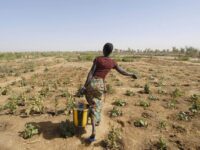
Genetically Modified Organisms
Ghana GMO News-Open Forum on Agricultural Biotechnology (OFAB)-Ghana has descended on Rite FM for publishing what they say is misinformation regarding the development of Genetically Modified Organisms in Ghana.
Ritefmonline.org published that the Director of Programmes at the Peasant Farmers Association of Ghana stated that Ghana risks violating patent rights in its quest to produce genetically modified organisms. According to the report, Mr. Charles Nyaaba explained that the country risks paying heavy fines to the rights holders if it embarked on this discourse.
“Mr. Charles Nyaaba said companies hold patent rights for seeds and can sue entities who produce such seeds without the required rights”, the report said.
OFAB is however livid about the publication. They accused the website of misinforming the public.
They insist GMOs in Ghana will not be patented to foreign entities for which reason Ghana will have to pay for them. They raise the argument that even non-GM seeds can be also be protected by patents and hence the fear being peddled is unfounded. They also explain that GM-seeds will not be forced on farmers but will totally be discretionary.
They assure Ghanaians that GM seeds will not be to their disadvantage but rather inure to increased productivity and other desirable traits.
Please read their Press Statement below:
GHANA DOES NOT RISK VIOLATING PATENT RIGHTS ON GMOs
The Open Forum on Agricultural Biotechnology (OFAB) Ghana is a civil society platform and a member of OFAB
Africa group, which aims at creating awareness on biotechnology and genetically modified organisms in Africa.
The Council for Scientific and Industrial Research (CSIR) hosts the project in Ghana.
OFAB Ghana has taken notice of an unfortunate misinformation on the Rite FM online platform titled “GMO
dialogue: Ghana risks violating patent rights” concerning the production and patency of GMOs in Ghana. We
deem it unfortunate that such continuous calculated attempts are being made to misinform the public about
the facts concerning GMOs, its development and commercialization in Ghana.
We will like to set the record straight and give the right information by stating emphatically that:
- The ownership of the patent rights of GM seeds are treated on case-by-case bases and should be understood
as such.
- Where through a joint research and development venture, the GM trait is introduced into a local
variety as happened with Bt cotton in Burkina Faso, there will be joint ownership and sharing of the
royalty.
- Where the technology owner directly or through an agency donates the GM trait to a beneficiary.
The beneficiary fully owns the right, as is the case with Ghana in the Pod Borer Resistant cowpea (a
GMO) under trial. Therefore, Ghana will own the right to the technology fully.
- A non-GM seed can also be protected by a public or private institution if that institution has invested money
A non-GM seed can also be protected by a public or private institution if that institution has invested money
and time to develop the variety and get returns/royalties on the investment. This will be in accordance with
the existing law. The research institution, seed producers and farmers must prosper from the use of a highly
improved protected seeds. It is not a zero sum game.
- It is worth repeating that the GMOs under trials in Ghana (cowpea and rice) currently have no issues of
patent right and can be considered public goods, because the rights have been granted to the public
institutions to develop the products on a royalty-free basis. The local public institutions, currently the CSIR
can determine the terms and conditions they will market the products after the National Biosafety Authority
has granted the permit for release.
- Local seed producers would be in charge of GMO seed production when approved for commercialization in
Ghana.
- GM seeds are not going to be imposed on farmers. Farmers would have the right to choose what seeds they
want to plant. Just as they have the choice now to use improved hybrid seeds or the traditional varieties.
All farmers of Ghana and the general public should be rest assured that our scientists have the capability and
the interest of the country to improve the agricultural system in ensuring food security. The quality of seeds we
plant is the first step towards ensuring the security of what we produce. GMO seeds that are either resistant to
pests, disease, drought or have enhanced nutritional value are a potent part to the multi-faceted solutions to
our food security.
Thank you.
Signed by
Enoch Ilori (Project Officer, OFAB Ghana) – 0245883731
For OFAB Ghana Team
What do you think about this piece? Share your comment in the comment thread and share the story using the social media buttons above. Thank you.



